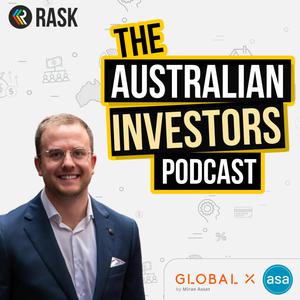
The Rules of Investing
Livewire Markets
The Rules of Investing is one of Australia’s top investing podcasts. We interview the leading investment minds from Australia and overseas to better understand their processes, philosophy, and current take on markets. After launching in October 2017, there have been over 100 episodes published - you can access all content on Livewire Markets, Spotify, Apple Podcasts and YouTube.
- 33 minutes 54 secondsHow to invest $1 million in 2025
The past few years have been kind to investors. A glance over 2024 asset class returns suggests that most Australian investors have been sitting on healthy gains for the past 12 months, with the much-loved banks leading the charge. Global equity exposure will have sweetened returns, with the S&P 500 clocking up consecutive years of +20%. Even conservative investors have been rewarded with returns on cash, which is the best we've seen in decades.
It's in our nature to resist making changes to a winning formula. However, with market leadership being highly concentrated and, for the most part, coming from high-growth stocks, there's a decent chance that your portfolio has developed a few biases and overweight positions.
Why does this matter? Markets have repeatedly reminded us that good times don't last. Reviewing your portfolio and making tweaks or rebalances is prudent. This ensures you harvest some of those gains and position your portfolio for all market conditions.
Livewire's James Marlay spoke with Charlie Viola from Viola Private Wealth and Ben Clark from TMS Private Wealth to explore the factors they think matter for 2025, discuss how they are allocating capital for the year ahead, and to get some professional tips on rebalancing your portfolio.
Putting theory into practice, he also revealed his SMSF portfolio and asked our guests to share the changes they would make.
To see the charts and tables referenced in the podcast are on this link: https://www.livewiremarkets.com/wires/how-to-invest-1-million-in-2025
ChartsInflation
Earnings Yield
Aus vs US earnings
Asset Allocation Tables9 January 2025, 10:00 pm - 44 minutes 23 secondsTop-rated adviser Paul Burgon reveals his 10 principles for investing in 2025 and beyond
If you’re feeling upbeat about markets as we head into 2025, you’re not alone. 41% of investors that participated in Livewire’s Outlook Series Survey said they are feeling optimistic about markets right now, well ahead of the following most popular response with 30% of survey participants saying they are feeling anxious.
The responses are not surprising, given the decisive run in equity markets in recent years. The S&P 500 is on the cusp of racking up consecutive years of 20%+ returns. A feat only achieved four times since 1926.
The other instances occurred in 1927-1928 before the great depression, in 1942-1943 during World War II, from 1995-1999 there were unprecedented gains with five 20%+ years and more recently in 2017-2018.
Investors are likely feeling optimistic given the strong returns on offer, whilst it is natural that anxiety is growing and a recognition that the good times won’t last forever.
Unfortunately, history provides little solace for those investors looking to the past in the hope that it might give some clues as to what 2025 might hold. The returns in the years following the four historical precedents are ambiguous, with a 50/50 split between negative and positive returns. However, the drawdown years were smaller than when markets continued to rally.
So, how does this information help us, and what should investors think about as we head into 2025?
To answer this question, we drew on the expertise of top-rated financial adviser Paul Burgon, Chief Investment Officer and Managing Partner at Lipman Burgon and Partners. Paul has decades of experience allocating capital on behalf of his clients and was ranked #6 in 2024 on Barron’s list of top financial advisers.
Even with his experience, Paul acknowledges that predicting the future is fraught with danger and a recipe for disappointment. However, over his career, he has developed a set of ten principles that he believes can underwrite investment success.
These principles draw on the renowned endowment model of investing developed by David Swenson and are now widely adopted by many leading investment institutions, including Australia’s Future Fund.
Yale’s endowment fund returns under Swenson are compelling, having delivered annual returns of 14% over 35 years.
Summarising the underlying objective of Burgon’s philosophy is relatively simple. He is seeking to remove or dampen the influence of emotions on investment decisions. In 2024, access to extensive research, institutional-grade investment models and improved access to private markets make it possible to achieve more consistent returns, reducing the prospect of poor decision-making at times of peak emotion.
While few of us will be seeking to replicate the allocation of global endowment funds, I’m sure most of us would like to bank the healthy returns of recent years and dampen the impact of any impending market dislocations.
“If you can have more reliability of outcomes in your equity allocation and more consistency of returns that is a much better way to allocate capital than trying to chase the next high-performing manager.”
In the final episode of The Rules of Investing, we hope to leave you with valuable asset allocation and portfolio construction insights from one of Australia’s top financial advisers. And while we’d all love to see another 20% + year from the S&P 500, it makes sense to ensure your portfolio can withstand the chance that 2025 could be a down year. Better to be safe than sorry!
13 December 2024, 4:30 am - 40 minutes 43 secondsAustralian house prices have soared 17x since 1981. Where will they go in 2025?
The Australian property market is incredibly nuanced. Markets like Brisbane, Adelaide, and Perth are soaring by double digits while the markets of Sydney and Melbourne have started to cool considerably. But even if prices in the largest housing markets are mellowing, it does not take away the core and indisputable argument: Housing may never have been affordable but now, the crisis is worse than ever.
Andrew Schwartz,
Co-Founder, CIO, and Managing Director at alternative real estate investment manager Qualitas, doesn't see this structural situation changing any time soon. When he is asked to reflect on the last 12 months in the property market, he effectively described 2024 as one of the less memorable periods of recent years.
"I think it'll go down as one of the less exciting years that we're going to think about when we reflect on the years that have gone by," Schwartz reflects. "As we're approaching the end of 2024, it's quite clear that markets are starting to slow down and a lot of that momentum is coming out of the market."But he does see next year becoming far more "interesting", "fascinating", and even a "thriller" for investors in this asset class.
"I think it's getting very exciting in 2025. There are many reasons why I feel that but in particular, residential property is affected by supply and demand and interest rates. When you look at each of those individual factors, you do see a market where Australia is caught short on the supply side at the moment and it's been very hard to get supply into the market. We have quite significant demand coming in and we have had a sustained period of relatively high interest rates," Schwartz says.
Schwartz's comments here on this asset class really matter. Qualitas, the company he co-founded, has nearly $9 billion in funds under management today, mainly from overseas and domestic institutional investors who want to access the lucky country's most famous asset. An asset that, Schwartz argues, is a better store of value than stocks, crypto, and even gold.
On this week's edition of The Rules of Investing, Schwartz is sitting down with guest presenter Hans Lee to discuss his views on these key tailwinds, his take on the macro environment, and where he sees growth opportunities in the Australian property market today.
(APPLE PODCASTS)
(SPOTIFY)
(PODBEAN)
other key insights you can expectForget stocks, crypto, and gold: Residential property may be the best store of value out there
- "I actually think that residential property is one of the best stores of value you can consider ... that is my personal opinion."
- "A beautiful store of value is buying land and you know we are going to be more and more densified over time. Personally, I find it hard to move away [from property] but that is how I think about residential property as a store of value."
It's not about whether house prices rise, it's just about whether house prices will fall
- "One of the key measures for us is around the margin the developer is earning on the project. I don't think about the margin as a developer making money per se. I think about margin as safety for error. How much could we afford for prices to wind back?"
Is the answer to unlocking housing supply just to "drop rates to zero"?
- "There is no doubt that if you want to stimulate the next round of the housing market, it's about dropping interest rates. The cost of capital is such a big factor in delivering projects."
- "However, the problem with dropping interest rates to that level is that one of the measures the RBA is very focussed on is the wealth effect of housing. The more people's houses are worth, the more they feel wealthy, and the more they go out and consume."
How much will it cost for Australia to build 240,000 homes a year?
- "Construction costs have risen some 40% over the last three years in Australia. As a generalisation, housing prices and apartment prices, in particular, have not gone up by 40%."
- "Groups like ours see a lot very large volume of project feasibility where developers would like to get their projects financed."
21 November 2024, 10:56 pm - 31 minutes 29 secondsBrigette Leckie: Investing is like a patchwork quilt
Koda Capital is one of Australia's elite wealth management firms, charged with allocating over $11.5 billion of capital on behalf of high-net-worth individuals, family offices, and charitable foundations.
For the past decade, Brigette Leckie has played a pivotal role in shaping the firm's views on where the best opportunities lie across global asset markets. Leckie firmly believes that understanding the macro environment is the starting point for building an investment strategy.
And while it's not every day that investors like you and me get to pick the brains of an asset allocator with Brigette's experience. In this episode of the Rules of Investing, you'll get a front-row seat and learn how Brigette makes sense of the dynamics in global economies and what that means for investors.
With a new regime set to take office in the world's largest economy and Australia's largest trading partner, China, amid a generational economic transition, the macro environment requires careful consideration for investors.
Around the world with Brigette LeckieFresh off the back of visits to Europe and the United States, Brigette made these observations.
Europe: Better than the headlines and muddling through 'muddle through'
- Traffic is everywhere (yes, worse than Sydney)
- A change in attitudes towards experiences over spending on goods persists.
- Restaurants and streets are buzzing, and with the exception of Germany, economies will continue to muddle along
- Manufacturing in Germany remains sluggish
United States: The gap is widening
- Inflation is real. Flights are at capacity, it's hard to get an Uber, and the streets are buzzing in many cities.
- The gap between the haves and the have-nots is widening.
- Politics remains highly divisive for families and corporations.
China: Three significant issues to deal with
Leckie says that China has been letting market forces deal with three major issues in its economy, and she expects these will take some time to resolve.
- Deflation: This remains an issue caused by excess capacity in the economy.
- Weak consumer: Consumer sentiment is fragile, creating a downward deflation spiral.
- Excesses of the property market: This is a well-documented issue that will take time to work through.
Historically, China's policy has been boom or bust. Leckie believes that a mindset shift has taken place, and the old approach is being replaced by genuine reform. The goal is to gradually turn China into a more consumer-based economy. A stronger China is good for global economies, especially Australia; however, we should not expect the boom days of the past to return.
So does macro matter?Leckie emphatically believes that understanding macroeconomics is the foundation of good investment strategy and asset allocation. She cites the example of interest rates near zero or negative as a point in time when the macroeconomics was 'out of whack' and providing a clear signal. Developed market bonds were 'uninvestable' in her eyes—a call that has been vindicated in recent years.
Currency markets can also provide a signal. Most of the time, currencies trade in a narrow range, but there are times when they get to extremes. For example, the Australian dollar was worth less than US50 cents, and equally, it traded at parity. For globally diversified portfolios, these extreme moments matter.
Three points for asset allocation right nowLeckie says returns in recent years have been exceptional, and investors should be mindful not to extrapolate these into the future. Knowing what risk you will tolerate is easy to underestimate when markets are ripping higher. Leckie had these key messages for investors.
- Hold your conviction on big calls. If you have a strong foundation for your positions, you need to be willing to ride out short-term noise.
- Investors are too bullish on risk assets and should be cautious about expecting these returns to continue
- Diversification will be crucial over the period ahead. Investors must ensure their portfolios are properly diversified with uncorrelated investments.
8 November 2024, 12:44 am - 39 minutes 11 secondsThe straightforward approach to picking ASX growth stocks (and 7 examples for good measure)
For those who love equities, you’re in for a treat with the latest Rules of Investing podcast. This week's episode features First Sentier Investors’ Deputy Head of Australian Equities Growth, David Wilson.
Wilson's bread and butter is picking high-quality growth companies - a role he executes every day as part of the team that runs the First Sentier Geared Australian Share Fund. He is not afraid to explain how he goes about doing this while acknowledging his missteps and sharing a handful of stocks he likes right now.
When it comes to his process for picking stocks, Wilson says it’s all “pretty logical”.
“We just try to invest in good businesses with management that are trying to do the right thing for you and with the right sort of balance sheet.
It's pretty straightforward. You can overcomplicate these things, but generally, that's our approach”, says Wilson.
Wilson adds that the team watches company management very closely:“What they're trying to achieve, what their goals are, but also at their actions, particularly when they make an acquisition or divestment - that's a point where you get a real insight into how a company is thinking," says Wilson.
Wilson points to Car Group (ASX: CAR) as a company with a solid acquisition history. The company is a recent addition to the portfolio, though Wilson acknowledges that he was a bit late to the party.
Another stock he particularly likes right now is pallet-maker and logistics company Brambles (ASX: BXB), saying that “the new management team has brought in a real pricing discipline over the last five years”, which has allowed them to cement a dominant position as a global leader.
In the following episode, Wilson also discusses the Fund's current overweights in tech and healthcare and names one stock from each sector that stands out (one of which is also the stock he would own if the market closed for five years).
In terms of what Wilson doesn’t like right now, he talks about the shrinking position of consumer staples and explains why they haven’t been “quite so staple” over the past year.
He also talks to sector underweights in energy, financials and materials – despite being overweight BHP Group (ASX: BHP) and Rio Tinto (ASX: RIO). For good measure, he also shares his thoughts on Rio’s takeover of Arcadium Lithium.
Finally, in explaining how valuations matter, Wilson shares why he is underweight Cochlear (ASX: COH), despite it being a great business.
Listen to the podcast to learn what keeps Wilson motivated after 40 years in markets, how he sees the current market conditions, and learn a little more about his process for picking stocks. For good measure, he'll even share with you which financial metric is a waste of time!Note: This interview was recorded on Tuesday22 October 2024.
25 October 2024, 2:22 am - 54 minutesMeet Armina Rosenberg: Mike Cannon-Brookes' former PM harnessing AI to outperform the market
In a world where artificial intelligence dominates headlines, few fund managers have harnessed it as boldly as Armina Rosenberg.
For those who don't know her, "Arms" made a name for herself at Grok Ventures, the family office of Mike Cannon-Brookes.
Now, she's paving a new path at AI-backed Minotaur Capital, alongside Perpetual alumnus Thomas Rice.
The duo have developed Taurient, a software system that uses large language models for everything from idea generation to portfolio construction.
In this episode of The Rules of Investing, Arms outlines how you can use AI to level up your own investment strategy, as well as a few stock ideas to get you started.
Note: This interview was recorded on Wednesday 9 October 2024.
Timecodes- 0:00 - Intro
- 2:13 - Lessons learnt from managing the wealth of Australia's mega-rich
- 7:32 - Family involvement in investment in family offices
- 8:56 - Differences between how retail investors and mega-wealthy invest
- 10:01 - What makes Minotaur Capital different from its peers
- 13:23 - How Arms and Thomas met
- 15:26 - How Minotaur's AI system Taurient works
- 25:21 - Mix of fundamental investing and AI
- 26:30 - Can AI help to know when to sell a stock?
- 27:37 - Can investors develop an AI-backed system themselves?
- 29:04 - How investors can use ChatGPT to make smarter investing decisions
- 31:21 - The future of funds management in an AI world
- 34:32 - Where the team sees opportunity today i.e. exciting themes
- 37:13 - Energy companies making waves on the global stage
- 39:10 - AI winners - why Minotaur is backing smaller players over the behemoths
- 39:55 - Healthcare ideas - and an emerging oral GLP-1 winner in Japan
- 41:25 - Why Japan is a "once in a generation opportunity"
- 42:53 - An example of a company Minotaur is shorting
- 45:18 - What the market is getting wrong today - private credit
- 47:36 - Stories of wins and losses and lessons from these
- 51:51 - Two stocks for the next five years (if the market were to close in that time)
11 October 2024, 2:46 am - 25 minutes 21 secondsBringing it all together: How to set up your portfolio for success - Livewire Live Mini-Series
Today, we’ll be bringing all the insights from Livewire Live together with the help of one of Australia's leading financial advisers and one of the country's top wealth managers.
Livewire’s James Marlay sat down with Alexandre Ventelon of Morgan Stanley Wealth Management and Charlie Viola of Pitcher Partners to answer our audience’s questions about asset allocation and give investors some tangible ideas on how to apply the lessons and insights from a full day of sessions covering multiple asset classes, themes and ideas.
This episode is part of our special mini-series of The Rules of Investing, giving you a front-row seat to discussions from Livewire Live 2024, our flagship investor event.
Whether you’re after big-picture market insights or actionable investment strategies, this series offers exclusive insights to help shape your investment decisions.
We hope you enjoy this special 7-part series. We’ll return to our regular programming with the next episode of The Rules of Investing.
________________
This series is proudly sponsored by Bell Direct Advantage.
Bell Direct Advantage is a premium trading platform designed for active and sophisticated investors. Offering access to Bell Potter research, exclusive IPOs, and advanced trading tools, it’s built to give you a competitive edge. Whether you’re a frequent trader or a high-net-worth individual trading shares, options, or warrants, Bell Direct Advantage delivers tailored solutions and superior service to sharpen your investing edge. [Find out more here]
9 October 2024, 8:00 pm - 45 minutes 44 secondsThe good, the bad, and the ugly - Livewire Live Mini-Series
Today, you’ll be learning about the good, the bad and the ugly of equities markets - with the help of:
- Dr David Allen, Head of Long/Short Strategies, Plato Investment Management
- Ben Griffiths, Executive Chairman, Eley Griffiths Group
- James Hawkins, Partner & Head of the Catalyst Fund, L1 Capital
- Dushko Bajic, Head of Australian Equities Growth, First Sentier Investors
This panel is hosted by Centennial Asset Management’s Matthew Kidman.
They explore the stocks they are bullish on today, the themes they believe are likely to suffer, and the stocks they recommend investors avoid (or short, if they can) over the months ahead.
This episode is part of our special mini-series of The Rules of Investing, giving you a front-row seat to discussions from Livewire Live 2024, our flagship investor event.
Whether you’re after big-picture market insights or actionable investment strategies, this series offers exclusive insights to help shape your investment decisions.
We hope you enjoy this special 7-part series. We’ll return to our regular programming with the next episode of The Rules of Investing.
________________
This series is proudly sponsored by Bell Direct Advantage.
Bell Direct Advantage is a premium trading platform designed for active and sophisticated investors. Offering access to Bell Potter research, exclusive IPOs, and advanced trading tools, it’s built to give you a competitive edge. Whether you’re a frequent trader or a high-net-worth individual trading shares, options, or warrants, Bell Direct Advantage delivers tailored solutions and superior service to sharpen your investing edge. [Find out more here]
8 October 2024, 8:00 pm - 36 minutes 45 seconds5 Shocking Predictions for 2025 - Livewire Live Mini-Series
Many of the best investing opportunities emerge when you think differently from the herd. This session will feature five high energy predictions that will challenge consensus thinking as investors look towards 2025 and beyond.
You’ll be hearing from five of Australia’s leading investment minds, including:
- Kellie Wood, Head of Fixed Income at Schroders
- Vihari Ross, Portfolio Manager at Antipodes,
- Bob Desmond, Co-Portfolio Manager and Head of Claremont Global
- Josh Clark, Lead Portfolio Manager at QVG Capital
- Matthew Kidman, Chief Investment Officer at Centennial Asset Management.
This episode is part of our special mini-series of The Rules of Investing, giving you a front-row seat to discussions from Livewire Live 2024, our flagship investor event.
Whether you’re after big-picture market insights or actionable investment strategies, this series offers exclusive insights to help shape your investment decisions.
We hope you enjoy this special 7-part series. We’ll return to our regular programming with the next episode of The Rules of Investing.
________________
This series is proudly sponsored by Bell Direct Advantage.
Bell Direct Advantage is a premium trading platform designed for active and sophisticated investors. Offering access to Bell Potter research, exclusive IPOs, and advanced trading tools, it’s built to give you a competitive edge. Whether you’re a frequent trader or a high-net-worth individual trading shares, options, or warrants, Bell Direct Advantage delivers tailored solutions and superior service to sharpen your investing edge. [Find out more here]
7 October 2024, 8:00 pm - 26 minutes 58 secondsUnlocking portfolio potential: Lessons from Soul Patts’ disciplined strategy - Livewire Live Mini-Series
In this session you’ll be hearing a fireside chat with Todd Barlow the CEO of Soul Patts, Australia’s oldest listed company.
Soul Patts is a diversified investment house often described as Australia’s answer to Warren Buffett’s Berkshire Hathaway. The company has established an incredible record of dividend payments to shareholders and today you’ll be getting an asset allocation masterclass from Todd and hearing about the opportunities he sees in the market today.
This session was moderated by James Unger, Head of Corporate Finance and Bell Potter Securities.
This episode is part of our special mini-series of The Rules of Investing, giving you a front-row seat to discussions from Livewire Live 2024, our flagship investor event.
Whether you’re after big-picture market insights or actionable investment strategies, this series offers exclusive insights to help shape your investment decisions.
We hope you enjoy this special 7-part series. We’ll return to our regular programming with the next episode of The Rules of Investing.
________________
This series is proudly sponsored by Bell Direct Advantage.
Bell Direct Advantage is a premium trading platform designed for active and sophisticated investors. Offering access to Bell Potter research, exclusive IPOs, and advanced trading tools, it’s built to give you a competitive edge. Whether you’re a frequent trader or a high-net-worth individual trading shares, options, or warrants, Bell Direct Advantage delivers tailored solutions and superior service to sharpen your investing edge. [Find out more here]
6 October 2024, 8:00 pm - 50 minutes 55 secondsHow big is the AI pie? Who wins and who get crushed? - Livewire Live Mini-Series
Artificial Intelligence is surely the hottest topic right now powering returns in stock markets and capturing our attention with its promise of productivity and innovation. But with such spectacular interest and returns I’m sure many investors are wondering if the opportunity has passed.
Our next panel will be picking the eyes out of the AI opportunity. How big is it and where are we in the cycle for this industry? Who will be the winners? And who will get crushed?
The panel features:
- Nick Griffin, Founding Partner & Chief Investment Officer, Munro Partners
- Jun Bei Liu, Lead Portfolio Manager, Tribeca Investment Partners
- Jacob Mitchell, Chief Investment Officer & Lead Portfolio Manager, Antipodes
This session was moderated by Livewire’s Deputy Managing Editor Ally Selby.
This episode is part of our special mini-series of The Rules of Investing, giving you a front-row seat to discussions from Livewire Live 2024, our flagship investor event.
Whether you’re after big-picture market insights or actionable investment strategies, this series offers exclusive insights to help shape your investment decisions.
We hope you enjoy this special 7-part series. We’ll return to our regular programming with the next episode of The Rules of Investing.
________________
This series is proudly sponsored by Bell Direct Advantage.
Bell Direct Advantage is a premium trading platform designed for active and sophisticated investors. Offering access to Bell Potter research, exclusive IPOs, and advanced trading tools, it’s built to give you a competitive edge. Whether you’re a frequent trader or a high-net-worth individual trading shares, options, or warrants, Bell Direct Advantage delivers tailored solutions and superior service to sharpen your investing edge. [Find out more here]
5 October 2024, 8:00 pm - More Episodes? Get the App
Your feedback is valuable to us. Should you encounter any bugs, glitches, lack of functionality or other problems, please email us on [email protected] or join Moon.FM Telegram Group where you can talk directly to the dev team who are happy to answer any queries.
 Equity Mates Investing Podcast
Equity Mates Investing Podcast
 Your Wealth
Your Wealth
 Australian Investors Podcast
Australian Investors Podcast
 Buy Hold Sell, by Livewire Markets
Buy Hold Sell, by Livewire Markets
 The Money Café with Alan Kohler
The Money Café with Alan Kohler
 Chanticleer
Chanticleer